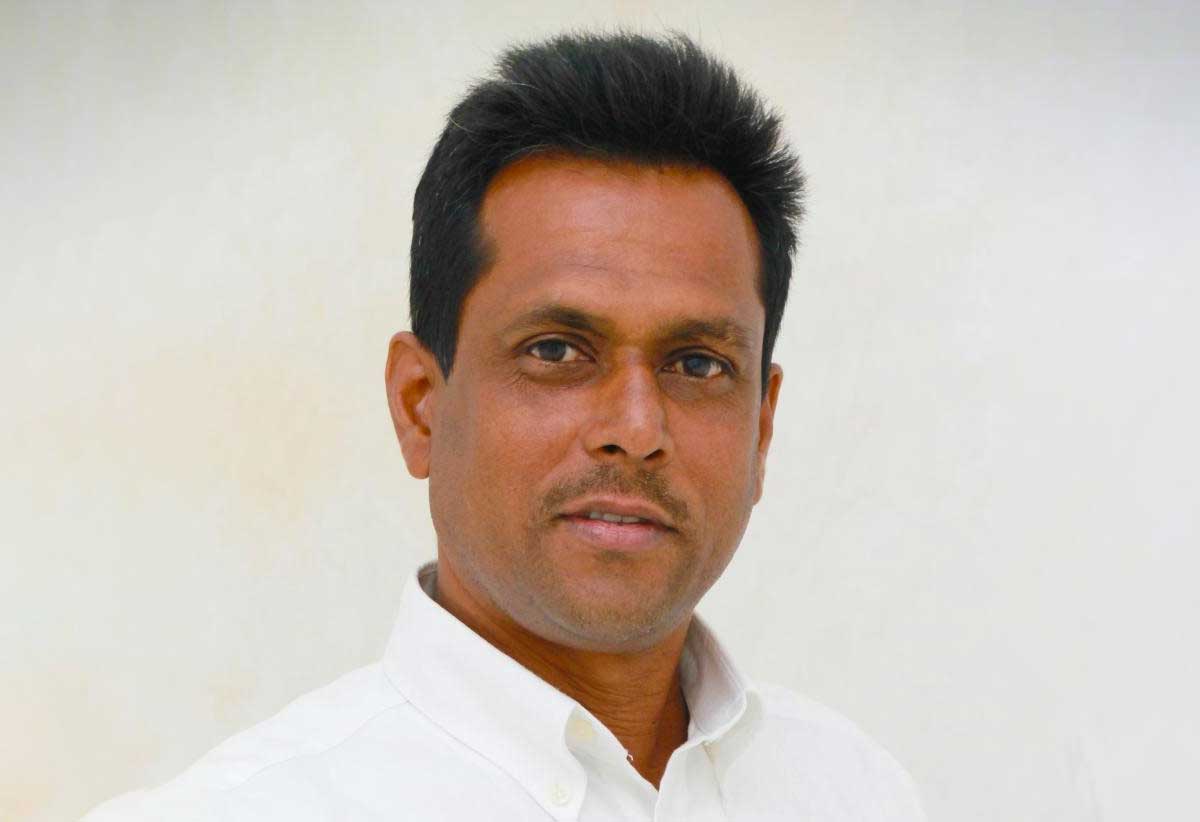

Thinking ‘business’ all his life, Rayneau Gajadhar started off doing a little bit of everything – from selling ice cream, cloth and jewellery to playing music (as a deejay) and racing motorcycles – before finding his home in the construction industry.
Starting from scratch, he built a ‘brand-new’ backhoe from two old ones purchased from a local company – and since then, the St. Marys ‘College Boy’ who maximized the scooping capacity of each $80 bucket of ice cream has built a strong construction company, crafted in his own image and likeness.
Construction and Industrial Equipment (CIE) is (by far) the most popular local construction company, with construction and building materials handled at his industrial plants at Corinth and Cul-De-Sac and with business outlets at Corinth, Monchy and Vide Boutielle.
CIE is the local agent for Hyundai heavy equipment and has been building everything from roads to hotels, and private and public edifices, most builders and developers are certain the company will deliver in full and on time.
It’s also the company governments turn to for emergency works or to simply bring dream projects to life.
It’s well-known in political circles, for example, that when governments of Saint Lucia (irrespective of which party in office) have road problems, they call Rayneau or CIE — like a decade-or-so ago, when, towards the end of a crucial General Elections campaign, CIE was contracted to build 23 roads in three months, which it delivered!
It’s also widely known that a former prime minister had a very hard time trying to convince his successor, during a Cabinet discussion, that “Whether you like Rayneau or not”, only CIE could have delivered on a crucial infrastructure project with the speed and certainty needed.
More recently, there’s also the case of successive governments being unable to complete the rebuilding of St. Jude Hospital in Vieux Fort, all of twelve years after it was burnt — until CIE was assigned to bring it back to life.
CIE also takes a keen interest in helping social causes and assisting people, giving a second chance to anyone wishing to turn their lives around.
For example, long before the crime rate got to where it is today, CIE was the only local company willing to contribute to and participate in a USAID-backed project aimed at rehabilitating prison inmates by providing them with skills that could help them reintegrate into society after release.
The National Skills Development Commission (NSDC) indeed praised Rayneau and CIE for agreeing to provide temporary employment for the inmates at his quarries and other business outlets, while other local companies were not so ready to place trust in or assist in changing the lives of young inmates at an overcrowded prison facility.
And then there’s Gajadhar’s willingness to put his money where his mouth is, to move earth and mountains: About a decade ago, CIE invested over EC$56 Million in importing heavy equipment from China – so much that it took three days (an entire weekend) for the trucks and tractors, cranes, bulldozers and other heavy construction equipment to be offloaded at Port Castries.
During the past decade, CIE quietly expanded into other Caribbean islands — building a state-of-the-art hospital in Dominica, quarrying and exporting agricultural produce in St. Vincent & The Grenadines, with added contracts in Grenada and Antigua & Barbuda – and supplying heavy-duty equipment in Guyana.
CIE has changed the name of the game in agriculture in Saint Vincent & The Grenadines, where his company went quickly from attracting criticism on entry, to an abundance of praise – also now shipping scrap metal from Hurricane Beryl’s thrashing.
Last week, CIE did it again: importing the most-powerful tug and the largest barge in the Eastern Caribbean’s construction industry – ‘Workforce’ and ‘Mokesh’ — again from China and through the Panama Canal.
CIE has been widening the scope of Rayneau’s vision, moving from not only building hotels to also now purchasing abandoned hotel properties and empty lots at strategic locations, for development of new facilities that can also include shopping malls.
Like any visionary investor who believes in innovation, Gajadhar tends to always look farther ahead than his competitors and has in the past two decades transitioned CIE from a wood-and-nails, cement-and-sand, bricks-and-mortar company with a steady production and distribution system, to a multi-functional company spreading its tentacles at home and abroad.
CIE was among the first local construction companies to invest in electric and air-conditioned bulldozers, loaders and cranes, eliminating noise levels while upgrading the skills of local operators and introducing 16-wheel trucks hauling the longest trailers – and insisting all his trucks hauling sand on public roads must be properly covered.
Gajadhar is also one-of-a-kind in how he assists and cares or shares with those who keep his company working: lending money to staff in need, assisting in family emergencies, settling satisfactorily with victims of on-the-job accidents, offering quick promotions to workers who show readiness to climb ladders, even inviting offending workers who admit guilt to decide their own fate.
CIE easily and readily deploys staff to refit, upgrade and paint schools, community centres, police stations and other public places, the only condition being using CIE’s trademark (orange and cream) colours.
Gajadhar is admired by those who know him for his easy-going and hard-working approach to business and national development.
Raised in the Barre d’Lisle area, he grew up close to Nature with a father who taught him everything all around them and a mother who was everything to her sons and daughters – and especially to Rayneau, with whom she lived the rest of her last days.
His simplicity has never left the CIE’s owner and Managing Director, who’ll purchase his daily meals and snacks from the same caterer selling to his staff; or he’ll stop by any roadside shop (if hungry at lunchtime) to purchase “a tin of tuna fish, a packet of biscuits and a soft drink” to slowly consume while catching-up with ‘missed calls’ and ‘messages’ on his cell phone.
His cell phone number is known to everyone – and unlike the average politician, he’ll answer or return all calls and messages, whether from Rock Hall in Castries, Bank’s Hall in Bridgetown, Rose Hall in St. Vincent, the DMZ Wall in Korea, or The Great Wall of China.
Another Rayneau characteristic is his insistence on being able to operate every single type of equipment his company buys — from forklifts and backhoes to loaders and excavators, from cranes and jack-hammers to asphalt and concrete plants, from driving long-haul trucks to flying planes and helicopters…
That’s the man friends know — another fast-growing local entrepreneur driven by mere vision and will to innovate, but whose progress and speed of expansion his critics and cynics (at home) try hard to associate with superstition.
He lost a dear brother in a deadly industrial accident at one of his plants, but, as one who turns setbacks into motivation to succeed, his every new job still draws mindless criticism from industry losers who took wrong gambles, or tried to follow his invisible steps.
As per usual, those only interested in wilfully blinding themselves to life’s blinding realities keep asking: ‘What’s Rayneau doing with all that money?’ – that, instead of acknowledging that thousands of Saint Lucians (and foreign) workers and supervisors — and their families – including from India, China and the Philippines and in other Caribbean nations, all eat out of CIE’s pot every working day of every month and year.
But even the most finger-pointing and head-scratching online and offline commentators will eventually unblind themselves to the realities staring them straight in the face, while Gajadhar and CIE continue making Saint Lucia proud – at home and abroad.



![MSS takes on VPSS in an action thriller [Photo credit: MYDS]](https://thevoiceslu.com/wp-content/uploads/2026/02/MSS-takes-on-VPSS-in-an-action-thriller-feat-380x250.jpg)
![Tapon House recorded its fourth consecutive title victory [Photo credit: MYDS]](https://thevoiceslu.com/wp-content/uploads/2026/02/Tapon-House-recorded-its-fourth-consecutive-title-victory-380x250.jpg)




![Julien Alfred, left, edges Jacious Spears to win the women’s 60 metres at the Tyson Invitational in Arkansas, USA on Friday [Photo credit: CMC]](https://thevoiceslu.com/wp-content/uploads/2026/02/Julien-alfred-1-380x250.jpg)



